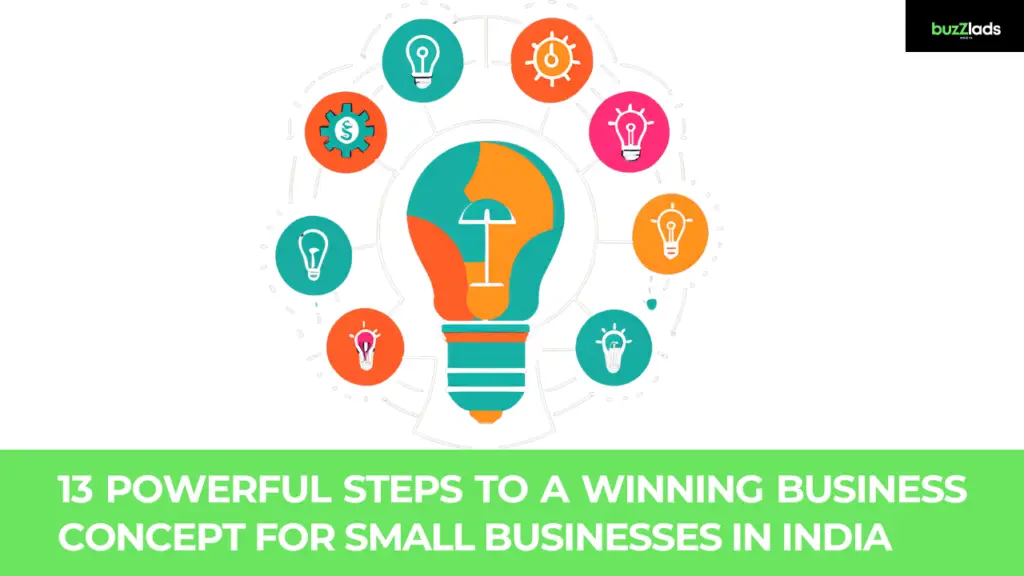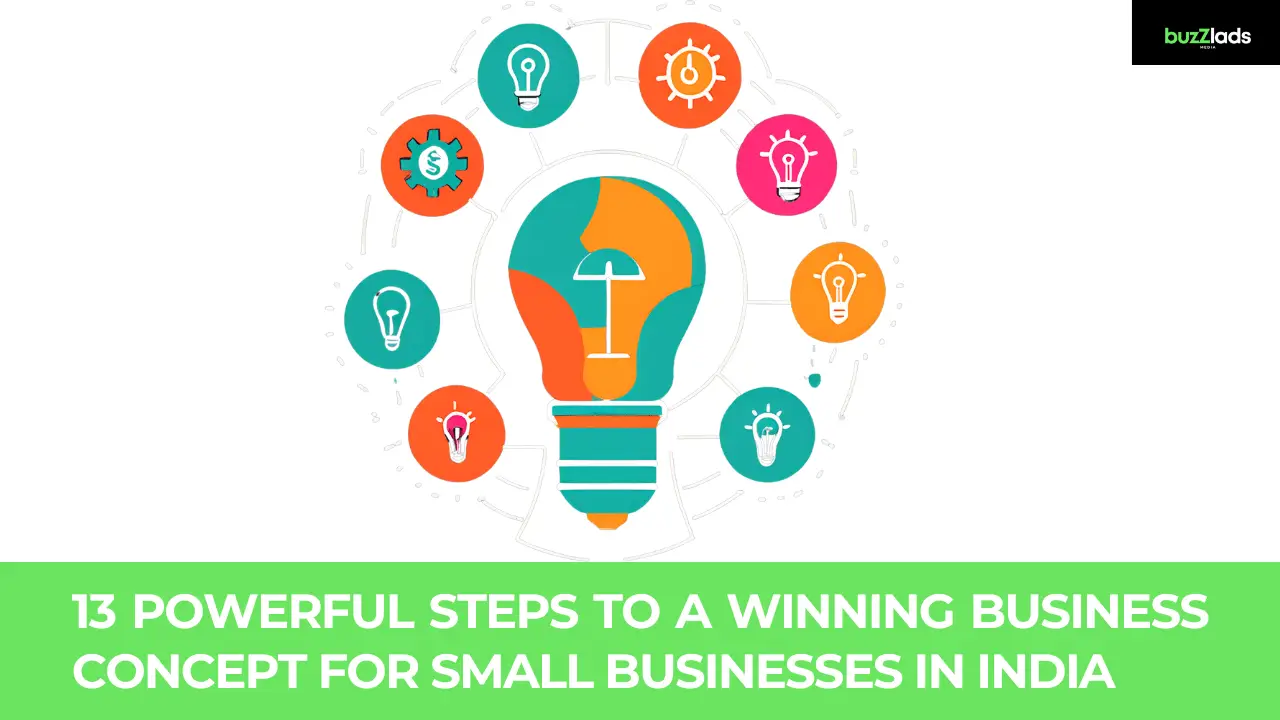
Starting a small business in India can be both thrilling and daunting. The key to navigating this journey successfully lies in crafting a robust business concept. Think of your business concept as the blueprint for your future success; without a strong foundation, the entire structure may crumble. In this article, we’ll guide you through the critical steps to create a winning business concept that will give your small business the best possible start in India’s dynamic market.
1. Understanding the Market
Before you dive into the specifics of your business concept, it’s crucial to understand the market you’re entering. The Indian market is vast and diverse, with unique challenges and opportunities.
a. Analyzing Market Trends
Keeping an eye on market trends is essential. What’s currently popular? What are consumers looking for? By staying updated on these trends, you can position your business to meet the demands of the market.
b. Identifying Target Audience
Your business concept should be built around the needs and preferences of your target audience. Who are they? What are their pain points? Understanding your target audience will help you tailor your offerings to meet their specific needs.
c. Researching Competitors
Knowing who your competitors are and what they offer can provide valuable insights. What are they doing well? Where are they lacking? This information can help you differentiate your business and find your niche in the market.
2. Defining Your Unique Selling Proposition (USP)
Your Unique Selling Proposition (USP) is what sets you apart from the competition. It’s the reason why customers should choose your product or service over others.
a. What is a USP?
A USP is a statement that clearly expresses what makes your business unique. It’s the combination of benefits that you offer that no one else does.
b. How to Identify Your USP
To identify your USP, consider what makes your business special. Is it your product quality, customer service, pricing, or something else? Your USP should resonate with your target audience and address their specific needs.
c. Examples of Successful USPs in India
Consider companies like Amul, known for its high-quality dairy products, or Zomato, which differentiates itself with its extensive restaurant network and delivery speed. These companies have strong USPs that have helped them dominate their markets.
3. Creating a Value Proposition
While your USP tells customers why you’re unique, your value proposition explains why they should choose your business. It’s about the value you offer to your customers.
a. The Importance of a Value Proposition
A strong value proposition is crucial because it directly addresses the needs of your customers. It should be clear, concise, and compelling, making it easy for customers to understand why they should do business with you.
b. Steps to Create a Compelling Value Proposition
To craft a strong value proposition, start by identifying the key benefits your product or service offers. Then, clearly articulate how these benefits solve your customers’ problems or improve their lives. Your value proposition should be a reflection of your USP and should resonate with your target audience.
4. Evaluating Your Business Idea
Once you have a clear business concept, it’s time to evaluate its viability. This step is crucial to ensure that your idea has the potential to succeed in the market.
a. Market Viability
Is there a demand for your product or service? Conduct market research to determine if your idea fills a gap in the market or meets an unmet need.
b. Financial Feasibility
Can your business idea be profitable? Create a financial plan to estimate costs, revenues, and potential profits. This will help you determine if your business idea is financially viable.
c. Scalability
Can your business grow over time? Consider how your business can scale as demand increases. Scalability is key to long-term success.
5. Understanding Legal Requirements
Starting a business in India involves navigating various legal requirements. It’s essential to understand these to avoid any legal hurdles down the line.
a. Registering Your Business in India
One of the first steps is to register your business. Whether you’re starting a sole proprietorship, partnership, or company, you’ll need to register your business with the appropriate authorities.
b. Understanding Local Regulations
India has a complex regulatory environment, with rules and regulations varying by state. Make sure you’re aware of the local regulations that apply to your business.
c. Protecting Intellectual Property
If your business involves unique products, designs, or brands, you’ll need to protect your intellectual property. This can include trademarks, patents, and copyrights.
6. Crafting a Business Model
Your business model defines how your business will operate and generate revenue. Choosing the right business model is crucial to your success.
a. Types of Business Models
There are various business models to choose from, including product-based, service-based, subscription-based, and more. Each has its pros and cons, so it’s important to choose one that aligns with your business concept.
b. Choosing the Right Business Model for Your Concept
Consider your target audience, product or service, and market conditions when selecting a business model. The right model will support your business goals and help you achieve long-term success.
7. Building a Strong Brand Identity
Your brand is more than just a logo; it’s the overall perception of your business. Building a strong brand identity is essential to stand out in a crowded market.
a. Importance of Branding
A strong brand helps you connect with your customers and builds trust. It’s what makes your business memorable and sets you apart from the competition.
b. Steps to Build a Brand in India
Start by defining your brand’s values, mission, and vision. Then, create a visual identity that reflects these elements. Consistency in branding across all touchpoints is key to building a strong brand.
8. Developing a Marketing Strategy
With your business concept in place, you’ll need a marketing strategy to reach your target audience and grow your business.
a. Identifying Marketing Channels
Consider which marketing channels will be most effective for reaching your audience. This could include social media, email marketing, content marketing, and more.
b. Creating a Marketing Plan
Your marketing plan should outline your goals, strategies, and tactics. It should include a timeline, budget, and metrics to measure success.
c. Leveraging Digital Marketing in India
Digital marketing is essential in today’s business environment. To effectively build an online presence and reach a broader audience, focus on key strategies such as SEO, social media, and online advertising. For businesses looking to get started with a robust digital marketing strategy, Buzzlads Media stands out as an ideal partner. With expertise in creating impactful online campaigns and optimizing digital presence, Buzzlads Media offers comprehensive solutions tailored to your needs. Choose Buzzlads Media to elevate your business’s online visibility and drive meaningful results.
9. Creating a Business Plan
A business plan is a detailed document that outlines your business goals and how you plan to achieve them. It’s a roadmap for your business.
a. Key Components of a Business Plan
Your business plan should include an executive summary, company description, market analysis, organization and management structure, product line or services, marketing and sales strategies, funding
request, and financial projections.
b. How to Write an Effective Business Plan
Be clear, concise, and realistic in your business plan. It should provide a comprehensive overview of your business and demonstrate its potential to succeed.
10. Testing Your Business Concept
Before launching your business, it’s important to test your concept. This allows you to identify any potential issues and make improvements.
a. Pilot Testing Your Product or Service
Consider running a pilot test with a small group of customers. This can help you gather feedback and refine your product or service before a full launch.
b. Gathering Feedback and Making Improvements
Feedback from your pilot test can provide valuable insights. Use this feedback to make any necessary adjustments to your business concept, product, or service.
11. Securing Funding
Funding is often one of the biggest challenges for small businesses. There are various options available, from self-funding to external investors.
a. Exploring Funding Options in India
In India, you can explore funding options such as bank loans, angel investors, venture capital, government grants, and crowdfunding. Each option has its pros and cons, so choose the one that best fits your needs.
b. How to Pitch Your Business Concept to Investors
When pitching to investors, it’s important to clearly communicate your business concept, market opportunity, and financial projections. Your pitch should be compelling and demonstrate the potential for a strong return on investment.
12. Setting Up Operations
With your business concept finalized and funding secured, it’s time to set up your operations.
a. Choosing the Right Location
The location of your business can have a significant impact on its success. Consider factors such as customer accessibility, cost, and proximity to suppliers when choosing a location.
b. Setting Up Supply Chains and Logistics
Efficient supply chains and logistics are crucial for ensuring that your product or service is delivered to customers in a timely and cost-effective manner.
13. Hiring and Building a Team
Your team is the backbone of your business. Hiring the right people and building a strong company culture are essential to your success.
a. Identifying Key Roles
Determine the key roles that need to be filled in your business. This could include roles in management, operations, marketing, and customer service.
b. Recruiting the Right Talent
Look for individuals who have the skills and experience necessary to help your business succeed. Consider cultural fit and alignment with your company’s values when hiring.
c. Building a Company Culture
A positive company culture can improve employee satisfaction and productivity. Define your company’s values and create an environment that supports collaboration and innovation.
Conclusion
Crafting a winning business concept is the first step towards building a successful small business in India. By understanding the market, defining your USP, creating a strong value proposition, and developing a solid business plan, you’ll be well on your way to success. Remember, every successful business starts with a great idea—so take the first step and start building your dream today!
What is the importance of a business concept?
A business concept is the foundation of your business. It defines what your business is, what it offers, and how it will succeed in the market.
How do I protect my business idea in India?
Protect your business idea by registering your business, trademarks, and patents. This will help you secure your intellectual property.
What are the best funding options for small businesses in India?
Some of the best funding options include bank loans, angel investors, venture capital, government grants, and crowdfunding.
How can I test my business concept before launching?
You can test your business concept by conducting a pilot test with a small group of customers. This allows you to gather feedback and make improvements before a full launch.
What are the common challenges in starting a small business in India?
Common challenges include navigating legal requirements, securing funding, understanding the market, and building a strong brand.




